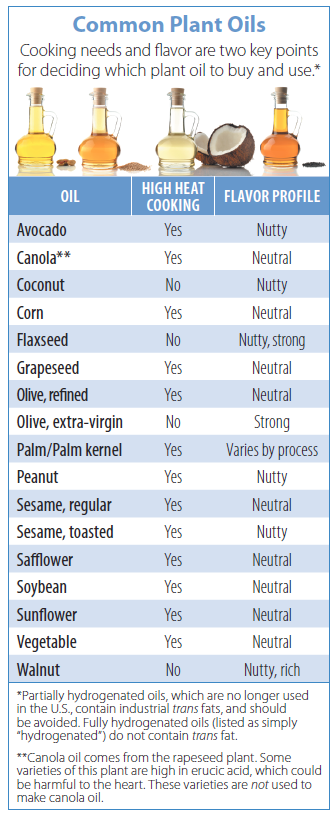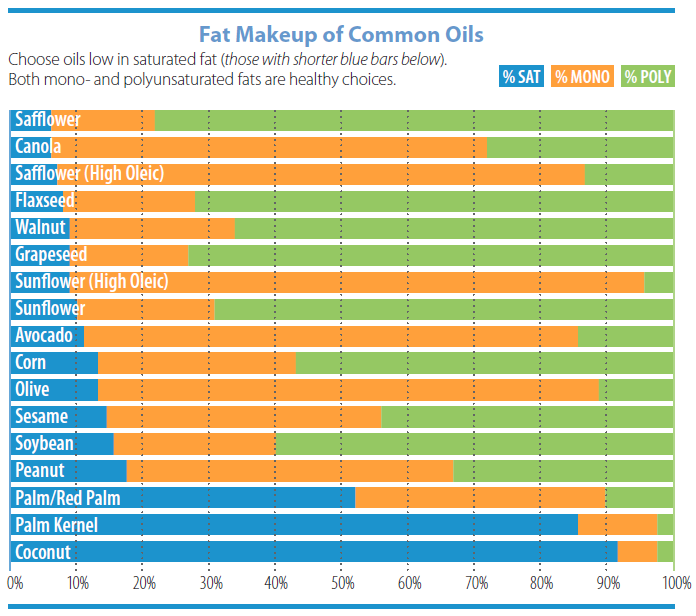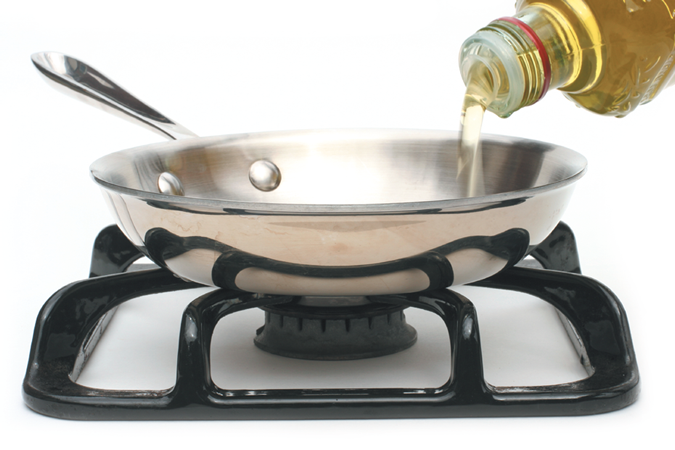There is a lot of confusing, and often conflicting, information in the media about which oil is the best for health. The information is confusing partly because plant oils are fats, and fats are complicated. Dietary ‘fats’ are actually composed of a mixture of molecules called fatty acids. Fatty acids come in different lengths, shapes, and chemical compositions. These factors determine how a fatty acid behaves in the body and how the body uses it. “Many online and social media sources claim that all ‘industrial’ or ‘refined’ plant oils are harmful to health,” says Dariush Mozaffarian, MD, DrPH, dean of the Friedman School of Nutrition Science and Policy and editor-in-chief of Tufts Health & Nutrition Letter. “If one looks at all of the research available, the cumulative evidence supports clear benefits, not harms, of plant oils.” Some of the key concerns and misconceptions are addressed here:
Q. Do polyunsaturated fats cause inflammation?
A. There are two main kinds of polyunsaturated fatty acids (PUFAs): omega-3 and omega-6. Omega-3 PUFAs have gotten a lot of positive attention for their heart-healthy and anti-inflammatory effects (think fish oil or flaxseed). In contrast, omega-6 PUFAs have been cast as the bad guy—but this is unfounded. “Certain omega-6 PUFAs can be converted by the body into mediators involved in inflammatory processes. It was therefore assumed that consuming these omega-6 PUFAs would increase inflammation,” says Frank Sacks, MD, professor of cardiovascular disease prevention at Harvard University. “However, controlled trials have found that PUFAs do not increase the concentrations of inflammatory markers, and omega-6 fatty acids can be converted to mediators that start to resolve inflammation.” Long observational studies of either dietary intake or blood levels of omega-6 PUFAs show lower risk of cardiovascular disease and diabetes with higher omega-6 levels.
Overall, there is a large body of research demonstrating that unsaturated fats are good for health. “In controlled feeding studies in humans, eating unsaturated fats (either mono- or polyunsaturated) lowers LDL cholesterol and also improves blood sugar control and insulin sensitivity,” says Mozaffarian. Additionally, the popular idea that omega-6 and omega-3 PUFAs should be consumed in a certain ratio is not supported by research.
Q. I’ve heard coconut oil is healthy. Why do you advise against using it?
A. “There is very little solid evidence on the long-term health effects of tropical plant oils such as coconut,” says Mozaffarian. Coconut oil is about 80 percent saturated fat, which is why it is solid at room temperature like animal fats—and why the American Heart Association and all other guideline-issuing bodies advise against frequent consumption of coconut oil. The primary saturated fatty acid in coconut oil, lauric acid, is known to raise LDL (bad) cholesterol, but it also significantly increases HDL (good) cholesterol levels. This mix of positive and negative health effects is at the root of the coconut oil controversy.
“Coconuts are a fruit, and, like other fruit oils, coconut oil contains numerous natural phytochemicals that may improve health,” says Mozaffarian. “I favor oils with stronger evidence for health benefits, however, like virgin olive, soybean, or canola oils. I suspect coconut oil is healthier than butter or starch and sugar, but this is a complex and controversial question for which more research is crucial.”
Q. Are corn and soybean oils made from genetically engineered crops safe?
A. Genetic engineering is the process of modifying an organism’s genes to change a characteristic of that organism. Nearly all of the commodity corn varieties used for things like oils and animal feed in the U.S. have been genetically modified to be herbicide and insect resistant. Commodity soybeans, as well as U.S. and Canadian rapeseed varieties used to make canola oil, have also been genetically modified. These altered genes are not going to show up in your oil, however. “Genes are blueprints for building proteins,” says Timothy Griffin, PhD, an associate professor and director of the Agriculture, Food and Environment program at the Friedman School of Nutrition Science and Policy. “Oils are fats. There are no proteins or genetic material in oil.”
The larger issue behind this question is whether genetically modified (GM) foods are safe for humans and for the planet. Griffin was part of a study committee that spent two years preparing a 585-page report on genetically engineered crops. “At this point—about 20 years into the production of GM corn, soybean, and cotton crops—we found no apparent health or environmental risks, but we should continue to be vigilant. The biggest impact we found on human health and the environment was actually a positive one: there has been a large reduction in the amount of highly toxic chemicals being used to control insects.”
For consumers who wish to avoid genetically modified crops, organic oils are available—for a price. Crops certified as organic in the U.S. cannot use GM technology.

Q. Which oil is the best choice for my health? And Why?
A. Any oil rich in unsaturated fats and low in saturated fats that also meets your taste preferences and cooking needs is a reasonable choice for your health [see Common Plant Oils.] Here’s why: Shifting from saturated to unsaturated fats (mono or poly) improves LDL-cholesterol, the type of cholesterol leads to heart disease. “Similar health benefits are seen when unsaturated fats are used in place of carbohydrates (starches, sugars),” says Mozaffarian. Every plant oil contains a mix of polyunsaturated, monounsaturated, and saturated fats. Fat Makeup of Common Oils (below) can help you choose oils higher in unsaturated fats.
Plant oils are made by extracting the fats found in fruits (such as olives and coconuts), seeds (like canola, safflower, and sesame), nuts, and legumes (like peanuts). Several processes are used to refine, bleach, and deodorize oils to create the consistent, mild-tasting products to which many are accustomed. “Most of the major studies demonstrating health benefits of plant oils have used the typical commercially-available refined versions, so refined oils are a perfectly good choice,” says Alice Lichtenstein, DSc, director of the Cardiovascular Nutrition Laboratory at the Human Nutrition Research Center on Aging and executive editor of Tufts Health & Nutrition Letter. “If you prefer minimally processed oils, look for those labelled raw, cold-pressed, expeller-pressed, virgin, extra-virgin, or pure.” Unrefined oils usually have higher levels of phytochemicals, which may provide additional health benefits.
“Good general-purpose oils include soybean, canola, and corn,” says Lichtenstein. “After that, choose on the basis of taste—for example olive oil for salad dressing and sesame oil for stir-fries. The important thing is to choose plant oils that contain mainly unsaturated fatty acids, and use them in place of animal fats.”

Try these tips when choosing oils:
-Use plant oils to replace butter, lard, and also starches and sugars in your diet.
-Use tropical oils (like coconut and palm) with caution. Long-term health effects of these oils are uncertain.
-Consider organic or cold-pressed oils, which may have additional health benefits from natural phytochemicals in the oils.
-Store oils in a cool, dry place and use within a year or less to avoid rancidity. Check for an “off” or paint-like odor before using.
-Cook with oils that can tolerate heat. Seeing smoke means unwanted free radicals may be forming. Do not reuse heated oils.

























Why bother with oils at all? They certainly aren’t needed for cooking. Why not just consume the plant/seed (olive, flax seed, chia seeds etc ), so you have your omega 3’s and omega 6’s AND all the other nutrients and fiber? The plant oils in cooking certainly are healthier than animal fats…. but, there is no evidence that they are healthier than a plant based diet without oil. Dr. Caldwell Esselstyn’s work shows the endothelial benefits of eating whole plant based, no oil. And studies with oils show a detriment to vasodilation – such as in Rueda-Clausen et al article “Olive, soy bean and palm oil intake have a similar acute detrimental effect over the endothelial function in healthy young subjects” Nutrition, Metabolism & Cardiovascular Diseases (2007) 17, 50-57.
Is grapeseed the same as canola??
The question of whether genetic modification is bad for us, and/or the world makes me wonder. Hasn’t natural processes throughout the histories of plants and animals been going on on this planet since they evolved? It seems to me that humans altering the genetic information of plants is akin to what “Mother Nature” has been doing since the beginning of the times those beings began. Humans just speeded up the process which has taken Mother Nature eon to accomplish. Of course, my scientific information is embryonic, the result of what was learned in public school, and in a first year college biology class in which historical information was not the main element the professor wanted me to regurgitate on an exam.
Great article!….but could you explain as clearly the difference between Mono & Poly unsaturated to add to our “informed choosing”… Thank you